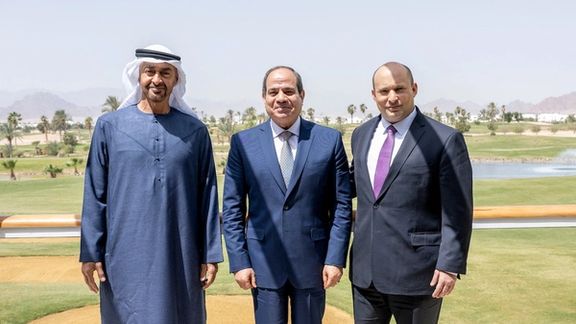Egypt, Israel, UAE Summit Focuses On Economic Challenges As Iran Looms

Leaders of Egypt, Israel and the United Arab Emirates met Tuesday for talks focused on economic fallout from the Ukraine crisis, while Iran was also discussed.

Leaders of Egypt, Israel and the United Arab Emirates met Tuesday for talks focused on economic fallout from the Ukraine crisis, while Iran was also discussed.
Egypt said discussions covered energy markets and food security. Both Russia and Ukraine are major exporters of agricultural products to the Middle East and North Africa.
Analysts said Iran’s regional policies were also brought up, but rising food and oil prices were more on the mind of Egyptian President Abdel Fattah al-Sisi in hosting Sheikh Mohammed bin Zayed al-Nahyan, Crown Prince of Abu Dhabi and de facto UAE leader, and Israel's Prime Minister Naftali Bennett. This was the first three-way summit since Israel and the UAE ‘normalized’ relations in 2020.
Egypt, the world’s largest wheat importer takes half of its imports from Russia and another 30 percent from Ukraine. Cairo Monday devalued its currency by 14 percent, and its Red Sea resorts are losing tourist income from wealthy Russian and Ukrainian visitors. The Egyptian military government that seized power in 2013 has strengthened links to Israel but despite over $1 billion aid from the US in 2021 may now seek financial assistance from the UAE.
Inadequate food
Egypt’s apparent priorities at Sharm el-Sheikh summit reflect increasing international concern over food supplies. Human Rights Watch reported Monday that regional governments needed urgently to find ways to protect their populations from the consequences of losing imports from Ukraine and Russia. Nearly one in three people in the Middle East and North Africa did not have access to adequate food in 2020, the HRW watch report said, an increase of 10 million people in just one year.
Israel, despite its links to Russia and Russian-speakers making up around 15 percent of its population, has broadly supported the US over Ukraine, while UAE has remained neutral and along with Saudi Arabia has resisted calls from Washington to increase oil exports to meet shortfall in Russian exports.
The Saudi government Tuesday stressed the “essential role” of the ‘Opec+’ agreement (production deals agreed by the Organization of Petroleum Exporting Countries with Russia) in balancing global oil supplies. The statement was taken as a sign it was unlikely the grouping would agree at its March 31 meeting to raise output as the US and some European states have requested in the face of rising prices. Benchmark Brent was at $111 a barrel Tuesday.
Iran Nuclear Deal
While the Gulf Arab states and Israel remain critical of efforts to revive Iran’s 2015 nuclear deal with world powers, the JCPOA (Joint Comprehensive Plan of Action), Iran is not topping the agenda in Sharm el-Sheikh. Bennett has moderated his past attacks on the JCPOA as some former Israel intelligence officials have cautiously supported the deal’s revival.
After the Gulf Arab states’ close relationship with the previous US administration of President Donald Trump, when they stepped up arms deals, their links had cooled under President Joe Biden.
But while the Biden administration has expressed concern over the humanitarian crisis in Yemen, where 4 million have been displaced, it has also lately increased military support for Saudi Arabia, including reportedly Patriot missiles, after Ansar Allah – the Houthis – have brought the war from Yemen, where Saudi Arabia has been involved since 2015, to missile strikes on the kingdom.